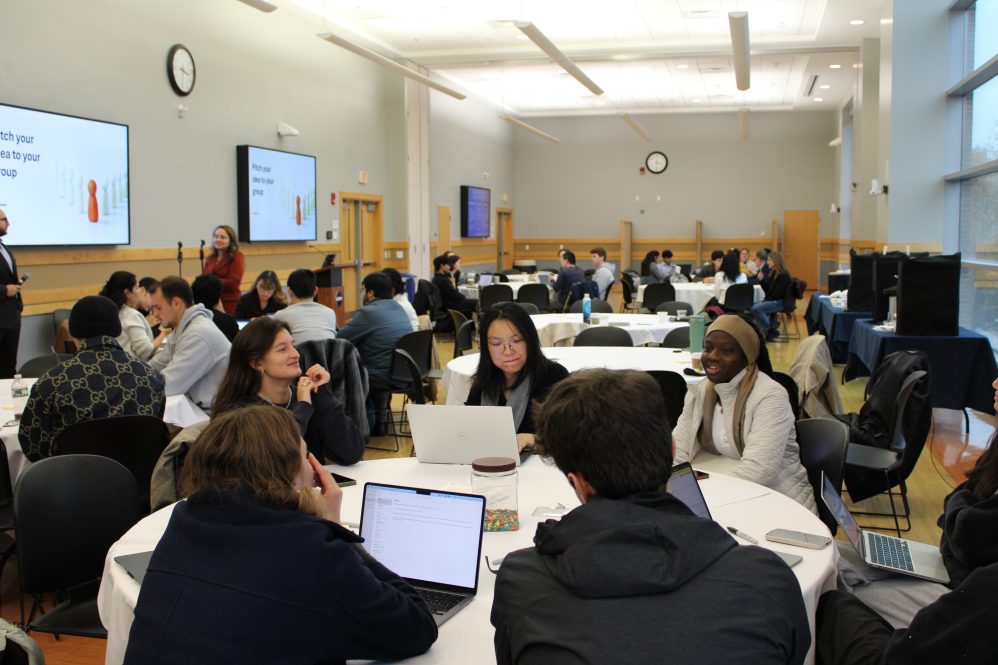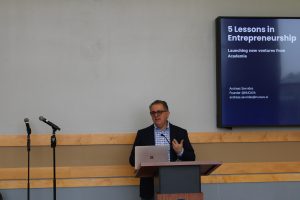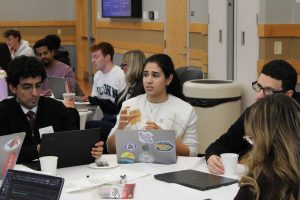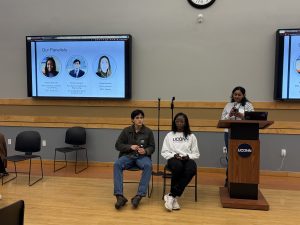The Entrepreneurship Hub's mission framed the entire afternoon: supporting UConn's technology community as they take ideas from early conceptualization to market-ready ventures.

Students participating in the entrepreneurship workshop activity. (UConn photo/Sarah Redmond).
UConn's John Lof Leadership Academy (JLLA) and Matthew & Margarethe Mashikian Innovation & Entrepreneurship Hub (eHub) jointly hosted an immersive, hands-on entrepreneurship event designed to help undergraduate and graduate students transform their research into viable, user-centered innovations.
 Featuring a keynote address from tech entrepreneur and former Yale professor Andreas Savvides and an interactive workshop led by Leila Daneshmandi, an assistant professor at UConn Engineering and the director of the eHub, and Duran Gonzalez, a scientist at Encapsulate, a precision diagnostics company, the event guided participants through the mindset, skills, and strategies needed to navigate the path from idea to impact.
Featuring a keynote address from tech entrepreneur and former Yale professor Andreas Savvides and an interactive workshop led by Leila Daneshmandi, an assistant professor at UConn Engineering and the director of the eHub, and Duran Gonzalez, a scientist at Encapsulate, a precision diagnostics company, the event guided participants through the mindset, skills, and strategies needed to navigate the path from idea to impact.
The Entrepreneurship Hub's mission framed the entire afternoon: supporting UConn's technology community as they take ideas from early conceptualization to market-ready ventures.

With this foundation, the program invited students to think beyond the lab-positioning their research as the engine for potential startups that deliver measurable value for users, communities, and industries.
Savvides shared a keynote titled, "Five Lessons in Entrepreneurship," which framed today's environment as an ideal moment to launch new ventures. He emphasized that scaling laws, shifting markets, and rapid technological change are creating unprecedented opportunities for innovators.
"The skills needed to enter the workforce are changing," said Savvides, "you need to learn how to use AI effectively in your startup venture."
Savvides's presentation focused on the following lessons:
- focus on application, not just innovation
- balance innovation with packaging
- go deep into your domain
- don't fear failure, use it to build muscle
- choose strong advisors
Some key takeaways were that entrepreneurs must examine how their solution is applied to real-world business problems, emphasizing that innovation is only as strong as the value it delivers. Academic research and commercialization move at different speeds and rely on different success metrics. Savvides urged students to consider the full market context, while remembering that even the best technology needs to be packaged in a way that resonates with customers.
Entrepreneurs need domain depth to identify pain points, navigate complexities, and build solutions that are truly unique, Savvides said. He reminded students that setbacks are inevitable, but they build resilience and clarity - critical traits when embarking on a startup endeavor. Finally, Savvides discussed the importance of choosing strong advisors who will help entrepreneurs avoid common mistakes, structure operations, and allocate resources efficiently.
Following the keynote, students transitioned into a guided, experiential workshop led by Daneshmandi and Gonzalez. The session centered around helping participants turn their research projects into compelling, user-focused concepts.

"We designed this workshop to push students beyond their individual research ideas and into real-world thinking. Within an hour, they began shifting from research-driven mindsets to user-driven ones," said Daneshmandi. "Entrepreneurship is collaborative by nature, and this workshop demonstrated how quickly ideas can grow when students engage with one another's perspectives."
The students began by turning their research into clear, foundational statements: what is the problem? Why is the problem important? What is the solution? Why is the solution unique? Who is the user or customer? How is the solution used?
The challenge was to answer each question in only one sentence. From there, students were asked to take a few minutes and create a 60-second pitch about their product. Each student shared their pitch with the group of people at their table, getting immediate peer feedback.
The second portion of the workshop centered around the groups working together. Each group had to select one idea, or combine several, to develop further as a team. In groups of six, the students revisited the same questions from the first part of the workshop.
Collaborative brainstorming encouraged students to think creatively, consider broader user perspectives, and refine their ideas towards greater feasibility.
The final group pitches were voted on by a panel of guest judges based on clarity and value. Students were also able to vote for their favorite concept.

The event concluded with an entrepreneur panel featuring Nicholas Nguyen and Adaeze Madauko, two UConn graduate students who founded their own companies.
Nguyen and Madauko shared insights from their entrepreneurial journeys and students had the opportunity to ask questions and learn about building a company as a student. Several other topics were discussed, including early-stage decision-making, pivoting, balancing risk, managing workload, and how to shape early ideas.






